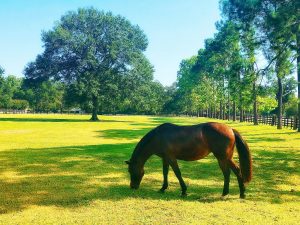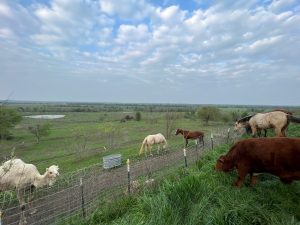Our horses have given us everything we have. To give back to them, we continue to learn and grow, improve our pastures and our treatment of them. The horses boarded at the Dude Ranch enjoy a diet with varied forage options, to improve gut health and function. Below, read an excerpt by Nikki, who participated in a reading, research, writing prompt to learn more about the best way to feed horses.
“Forage is the foundation of a horse’s diet and provides 50-90% nutrient intake. Horses have unique and sensitive digestive systems therefore, horses need to consume a minimum of 1% of their own body weight in grass and hay. Most people feed their horses 2-2.5% forage which is about 10-20 pounds! “This means that a 450 kg (1,000 lb) horse will easily eat 5 to 7 kg (11 to 15 lb) of forage per day, along with 1.5 to 3 kg (3.3 to 6.6 lb) of a grain ration in order to maintain a healthy digestive system and good body condition.” (Huntington, Good-Quality Forage..) However, lactating mares or young horses may consume a larger amount of forage. When nutrient related problems arise, grain ration is often looked at first. There are different types of forage and different factors that contribute to the quality of forage. For example: plant species, fertilization, maturity at time of harvest, weather conditions, etc. all take part in the quality of forage. Legume hays have much higher protein, energy and calcium than grass or cereal hays.
“A healthy and appropriate diet contains six basic nutrients: carbs (fibrous/non-fibrous) fatty acids/fats, proteins/amino acids, minerals, vitamins and water. High quality forage provides a slow-burning, low carb, fiber-rich option for horses which makes it a horse superfood! Chewing hay breaks it down for easy digestion, which is super beneficial! Horses get more nutrients from food that takes a longer time to digest. Being low calorie, hay provides fiber, bulk and energy, therefore keeping the horse full for longer.
“Hay, which ends up in the hindgut (cecum/colon), can hold up to 32 gallons of fibrous material which ferments over 2-3 days producing volatile fatty acids. Horses can get up to 70% of energy from the fermentation of the hindgut! Which is quite impressive! Grains and feed that are overly processed travel through the hindgut too quickly to absorb any valuable nutrients, leading to hindgut acidosis. Hay may not be completely sufficient for horses who are higher energy (sporting horses) or horses that get worked everyday. In this case, supplements like grain/pellets and access to fresh grass that aids in the lack of sufficient energy is tremendously beneficial! “If hay isn’t available, you can feed high fiber feeds that contain a large percentage of chaff.” (Huntington, Good-Quality Forage..)
“In conclusion, good quality forage is essential to your horse! When choosing your feed it’s very important to choose the healthiest type of forage for your horse, so attention to detail/warning signs is major. Making a point to feed your horse a balanced diet with good quality food is non negotiable! Happy horse, happy life…I think.”
Works Cited
Huntington, Peter. “Good-Quality Forage Important for Horses.” Kentucky Equine Research, 31 Dec. 2017, ker.com/equinews/good-quality-forage-important-horses/.
If you would like to contribute to our reading, research, writing activities, please reach out to us! You can Contact Us for more info. Looking for information about boarding your horse with us? Check out our Horse Boarding page.


